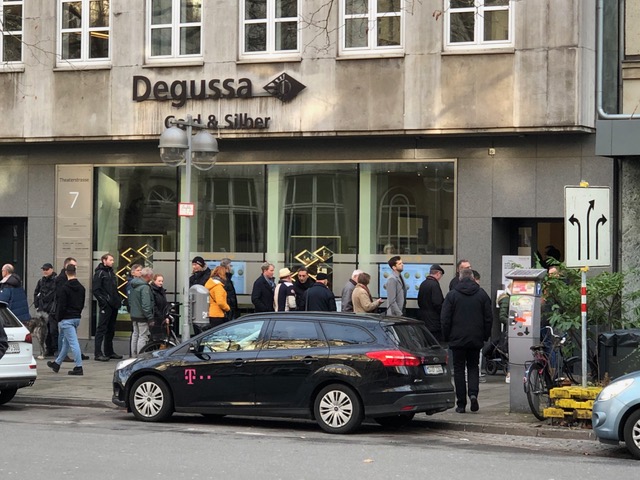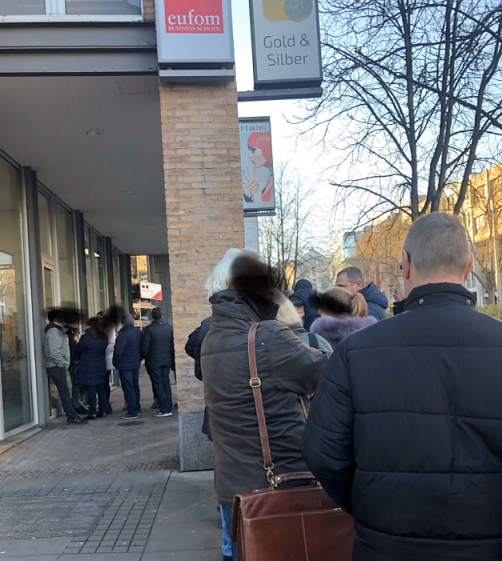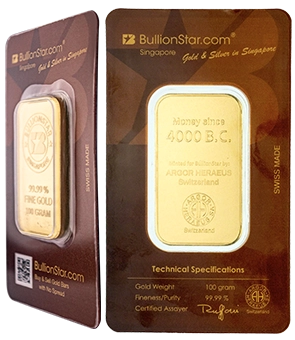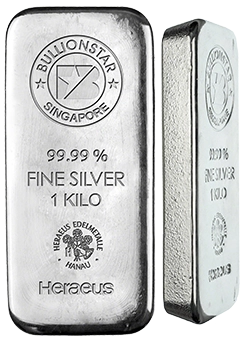German Government Escalates War On Gold
In the run up to the end of the year during December, a remarkable sight emerged across Germany – long lines of customers queuing up outside the country’s precious metals shops and gold dealer showrooms.
Was it seasonal gift buying by Germany’s citizens, a population well-known for its love of physical precious metals? Or perhaps the onset of panic about negative interest rates in Europe’s largest economy?
As it turns out, panic it was, but of a different type, with the long lines triggered by the realization that from 1 January 2020, new national legislation was to take effect that would dramatically reduce the threshold on anonymous buying of precious metals from the existing €10,000 limit to a far lower limit of €2000, all under the guise of money laundering prevention.
With a staggering 9,000 tonnes of gold held by the German population, 55% of which is in the form of physical gold bars and gold coins and the rest in gold jewelry, Germany’s citizens are savvy about gold and are active savers and investors in the yellow precious metal. Add to this the fact that the German bullion market is one of the most sophisticated and developed in the world, supporting an extensive set of industry participants from banks and gold refineries, to nationwide gold dealers and distributors, to smaller regional and local bullion retailers.
Panic buying – We are being overrun
So when the German government throws up restrictions on such a fundamental right as anonymous buying of gold and other precious metals, Germany’s citizens were going to sit up and take notice and do what any rationale economic actor would do in the circumstances – buy as much gold as they can get their hands on before the 1 January deadline. Hence the queues and long lines outside the gold shops including some of Germany’s biggest gold dealers such as Degussa and Pro Aurum.
Börse Online, Germany’s leading investor magazine, summed up the situation in its 13 December article “Supply shortages at gold traders: ‘We are overrun, the queues go up into the street’“:
“Large gold traders such as Pro Aurum and Degussa are currently experiencing massive bottlenecks in gold products, and customers are literally buying their shelves empty. “We are currently being overrun," says Raphael Scherer, managing director at Degussa Edelmetalle. “The queues go up into the street."
It is similar with Pro Aurum. Like Degussa, the company is one of the largest gold traders in Europe. “We are currently seeing a tripling of the normal order volume – both online and in the branches," says Robert Hartmann from Pro Aurum"
Deutschland steht die nächste Währungsreform bevor.
Vor Degussa in Köln bildet sich eine Schlange derer, die anonym #Gold kaufen, bevor das ab 1.1.20 dank #Groko nur noch bis 2.000 statt 10.000 #Euro möglich ist. So werden die Bürger gezwungen, im wertlosen Euro zu bleiben. pic.twitter.com/Fju8aJW4Cn— Alice Weidel (@Alice_Weidel) December 30, 2019
Kerstin Botschek, Branch Manager at Degussa in Cologne, explained the situation to German newspaper Die Welt in its 23 December “Legislative change creates queues in front of gold trading houses“:
“These long lines are based on the lowering of the cash limit. 98.5 percent of customers want to buy gold for less than 10,000 euros without registering. Few are buying jewelry any other gift.”
The situation was similar at Pro Aurum in Munich which it documented on its website:
“Many Pro Aurum employees in Munich cannot believe their eyes…the line of waiting customers extends to the on the sidewalk in front of the building. In the freezing cold, people persevere to buy physical precious metals. You take everything that is still available with you – but the product range is shrinking day by day, because the demand is simply overwhelming."

Germany goes beyond the EU Directives
To understand why this is truly part of a war on gold by the German government, we must understand the background to this legislation. The European Union (EU), of which Germany is a member, regularly issues legal Directives on all manner of subjects. These directives, although they are required to be reflected in the national law of member states, don’t dictate how they should be reflected in national law, and so member states have flexibility in how they implement the directives within their national legislations. One such body of Directives are the EU Anti Money Laundering Directives, which the EU claims are to protect the financial system from being used for money laundering and terrorist financing.
In mid-November 2019, Germany’s parliament, the Bundestag, enacted a German federal government bill which implemented a European Union (EU) amendment to the fourth EU Money Laundering Directive. This amendment, known as the fifth EU Money Laundering Directive, was introduced by the EU in 2018, and then EU member states had until 10 January 2020 to reflect the changes in their national law via domestic legislation. The German Federal Council then passed the Bundestag’s act on 29 November and the law came into force on 1 January 2020.
But on this occasion, the German government in its legislation, went much further than the requirements of the latest EU Money Laundering Directive. Specifically, as regards transactions in precious metals, the new German law passed in November (a draft of which is here in pdf) lowered the threshold on where precious metals can be bought without identity checks (anonymous transactions) from €10,000 to €2,000 per transaction.
In Germany, anonymous transactions such as these are known as “Tafelgeschäfte”. Generally speaking, the German concept of “Tafelgeschäfte” can refers to any over-the-counter transaction for an investment or security that a customer can receive in physical form. This could include bearer bonds or an equity security with attached dividend coupons, as well as physical precious metals bars and coins. In these literally “over the counter” or across the counter transactions, customers do not need an account to perform the transaction, and customer identity remains anonymous, e.g. in the case of gold, the customer pays cash, and the dealer or bank hands over gold bars or coins.
But while the 2018 EU Directive said nothing whatsoever about precious metals, this did not stop the German federal government from dramatically lowering the anonymous threshold for precious metals transactions in its 2019 version of its domestic bill, a bill that it claims reflects the fifth EU Money Laundering Directive.

Its also important to note that the existing €10,000 threshold limit on anonymous precious metals transactions in Germany (Tafelgeschäfte) had only been in existence since 2017. Prior to that, the reporting threshold was €15,000. This threshold reduction from €15,000 to €10,000 was also rail-roaded through in German legislation which supposedly reflected the 2015 EU-Directive against Money Laundering and Terrorism Financing (a.k.a. the fourth EU AML-Directive). But again in that instance, while the 2015 EU Directive said nothing about precious metals, the 2017 German legislation defined a list of ‘high value goods’ including “precious metals such as gold, silver and platinum”, “gemstones” and “jewelry and watches”, deeming that:
“All goods dealers who make or receive cash payments of 10,000 euros and more (previously 15,000) will have to fulfill the obligations of the Fourth Money Laundering Directive”.
When it becomes serious, you have to lie
Fast forward to the 2019 German bill and out of nowhere it states that:
“The findings of the national risk analysis have shown that, especially in the area of gold trading, heavy cash transactions are taking place just below the current threshold for identification obligations of 10,000 euros, … The threshold of EUR 2,000 envisaged in the draft law aims to prevent or significantly limit this bypass trade.”
And also:
“In the area of precious metals trading, strong cash transactions can be observed below the threshold amount of 10,000 euros that was applicable under the previous legal situation. At the same time, there is an increased risk of money laundering in the area of precious metals trading. The regulation is necessary to prevent possible evasion and smurfing.”
Strong cash flows observed by who, you might ask? Certainly not the bullion industry. According to, Raphael Scherer, managing director at Degussa Edelmetalle in a December interview with Borse Online:
“gold traders must already report suspected cases of money laundering. ‘We also reject customers who think they can buy Eur 9999 multiple times from us to get around the threshold’ said Scherer. ‘There are such cases," but these are isolated cases.‘"
The lack of concrete evidence put forward by the Federal government for lowering the transaction threshold was also not lost on German parliamentary deputies, some of whom submitted questions government asking for details. The following questions are from Frank Schäffler, Christian Dürr, and Dr. Florian Toncar of the FDP, and the answers from the government are shocking to say the least:
Q 1. To the best of the knowledge of the Federal Government, what is the value of the precious metals held by private individuals in Germany?
Answer: The Federal Government has no knowledge of this.
Q2. What was the annual volume of trade in precious metals in Germany during the last five years, according to the Federal Government (please break down the answer according to the individual years and precious metals)? How much of this is accounted for by private individuals?
Answer: The federal government has no information on this.
Q3. To the knowledge of the Federal government cabinet, what was the annual volume of cash transactions for precious metals in Germany in the last five years (please break down according to the individual years)?
Answer: Money laundering supervision of the trading of precious metals in the non-financial sector is the responsibility of the Länder. Therefore, the government cabinet has no information on the annual volume of cash transactions in precious metals.
Q3 a) How many people living in Germany have bought precious metals using anonymous cash transactions in the past five years?
Q3 b) How many individual transactions of this type (cash for precious metals below Eur 10,000) have been carried out in the past five years?
Answer: The federal government has no information on this.
Q3 c) What proportion of these cash transaction business for precious metals is accounted for by trading in gold, silver or platinum?
Answer: The exact share of gold, silver and platinum Tafelgeschäfte (anonymous over the counter transactions) is not known to the federal government. The findings available to the federal government from the competent supervisory authorities of the Lander suggest that the vast majority of them in the non-financial sector involve trading in gold. In contrast, the trade in silver and platinum is considerably lower.
Q4. To the knowledge of the federal government, how many precious metal dealers are there currently in Germany?
Q 4 a) How many of them do transactions of cash for precious metals below the Eur 10,000 limit?
Answer: The money laundering supervision of trading in precious metals in the non-financial sector is the responsibility of the Länder… The federal government therefore has no findings.
Q4 b) According to the federal government, how many precious metal traders have been involved in money laundering or terrorist financing over the past ten years?
Answer: Reference is made to the answer to question 6b
War on Gold – War on Truth
The answer to question 6b makes incredible reading and really torpedos any claim that the German government need to target precious metals transactions for money laundering.
Q6 b) In how many reporting or criminal cases was there a reference to precious metals?
Answer:
In 2017, of 59,845 suspicious transaction reports that were recorded by the Central Office for Financial Transaction Investigations (FIU), 64 related to precious metals.
In 2018, of a total of 77,252 suspicious transaction reported to the FIU, 175 related to precious metals.
So over the most recent two year period, of 137,097 suspicious transactions reported to the Central Office for Financial Transaction Investigations, only 239 cases related to precious metals. That’s just 0.17%. But wait! It gets more ridiculous. Of these 239 cases reported to the FIU in which precious metals were involved, only 4 of these involved amounts below the already applicable € 10,000 threshold. Just 4 cases.
According to Bundestag deputy, Frank Schäffler:
“If the government lowers the threshold forTafelgeschäfte [over the counter transactions] only because of four specific cases, it shows the absurdity of the tightening."
The questions continue:
Q6 c) To the best of the knowledge of the Federal Government, how often and to what extent over the past ten years have anonymous cash transactions for precious metals been used for money laundering
Answer: No statistical data are available about the frequency of the use of so-called “Tafelgeschäfte" for the purpose of money laundering
Q7. What information does the Federal Government have “that especially in the area of gold trading, a strong cash flow just below the current threshold for identification requirements of 10,000 euros takes place”?
Answer: The reduction in the threshold amount is based on the findings of the national risk analysis of the federal government, in which the supervisory authorities of the federal states as well as the police and law enforcement and security authorities contributed findings.
In the area of precious metals trading, a strong cash traffic below the current legal situation threshold amount of 10.000 euro was observed. At the same time, in the area of precious metals trading there is an assumed increased risk of money laundering.
As a product – comparable to cash – precious metals offer a high degree of anonymity and are suitable for the investment of large amounts with above-average value stability, easy transportation and global acceptance.
In other words, these statists detest all the positive characteristics of gold. The questions continue:
Q8. What benefits does the federal government expect from lowering the threshold on anonymous over the counter transactions?
To what extent does the federal government estimate that money laundering transactions would be prevented by the new upper limit [lower threshold]?
Answer:…The regulation is particularly necessary in order to avoid possible circumvention and to prevent the artificial splitting of transactions (“Smurfing").
Due to its arbitrary denomination of transactions without loss of value and its high acceptance as a means of payment, trading in gold is particularly vulnerable to money laundering.
With this reduction, a threshold amount is being chosen at which it can be assumed that it will be economically unattractive for refineries and traders to reduce the delivery weight [of metal] with the aim of falling below the threshold [economically unattractive in smaller bars or coins]
Q11. What is the upper limit for panel laws is provided to the knowledge of the Federal government, at least?
Q 11a) Why does the federal government go beyond the minimum ceiling of EUR 10,000 in the fourth EU money laundering Directive (2017)
Answer: The new 2019 Germany act reduces the threshold because it’s a risk-oriented extension of the due diligence obligations of precious metal traders. The reduction of the threshold amount is based on findings from the National Risk Analysis of the federal government. These national findings provide no basis for an EU-wide scheme.
In other words, the German government has gone far beyond any EU Directive and is explicitly targeting gold transactions and gold ownership with no mandate from any EU Directive.
Q 12. What is the federal government’s assessment of the last amendment to the Money Laundering Act of 26 June 2017, in which the upper limit for anonymous precious metal transactions was lowered from Eur 14 999.99 euros to EUR 9 999.99 ?
Q12 a) How did the last change affect the over the counter cash transactions business in Germany impact?
Q12 b) to what extent could money laundering via precious metal be prevented by this, according to estimates by the federal government?
Answer: The money laundering supervision of the trade in precious metals lies in the responsibility of the Länder (German states). The Federal government has no regulatory insights into questions a) and b) on the development of over the counter cash transactions and the prevention of money-laundering cases. Otherwise, refer to the answer to question 7.
So in less than three years, the German government has reduced the threshold on anonymous cash transactions for physical precious metals from €15,000 to €10,000 and now to €2000. That’s 7.5 times less. But where did such a view come from? Certainly not from Germany’s gold dealers, nor from any studies by the federal government. And they have now lowered the limit from €10,000 to €2,000 on the basis of 4 possibly suspicious FIU cases i.e. on no evidence at all.
Warteschlange @degussa_gold in Köln. Vertrauen in den #Euro und unsere #Politik muss enorm sein. #bargeldobergrenze #eu #negativauslese #eliteproblem @Markus_Krall pic.twitter.com/7hSKHdMHNG
— marc friedrich (@marcfriedrich7) December 23, 2019
The entire confidence trick of the Federal government on justifying the lowering of the precious metals threshold refers to the “national risk analysis". This risk analysis, however, is just a bunch of management consultant-speak claims lacking in any evidence that directly target cash and gold transactions, and where the only thing it says about gold is the following:
“Anonymity: It goes without saying that those involved in money laundering and terrorist financing wish to remain anonymous. The assessment has shown that criminals prefer to use cash over other payment methods, since cash payments leave fewer traces.
Cash is not only popular among criminals; it is also favoured among law-abiding citizens. Coins and banknotes are the most commonly used means of payment in Germany. Nonetheless, accepting cash payments remains risky because the cash could have been obtained by criminal means…
Because criminals also use gold and other precious metals in their illegal dealings, such cash-like assets are also associated with an increased risk of money laundering and terrorist financing.“
And there you have it. This direct attack on both cash and gold from the ‘national risk analysis’, without a shred of evidence, but implemented into the new German law, has now taken Germany one more step closer towards the lose of freedom that gold provides.
Next Stop €1000
And there is more. The reduced threshold of €2000 now means that even the purchase of a 50 gram gold bar in Germany cannot be done anonymously and is now above the reporting threshold, not to mention the 100 gram and 200 gram gold bars that are very popular among German gold buyers.
Last September, the German Federal Council (government cabinet), when commenting on the draft law, even wanted the reportable limit for precious metals to be lowered to €1000, not €2000, saying that:
“although the reduction in the threshold from EUR 10,000 to EUR 2,000 is a step in the right direction, in practice it would be just as ineffective against money laundering as the previous threshold of 10,000 euros, since the cash payments for the usual trade size of one ounce (a little over 1 000 euros) can still be divided into anonymous invoices.
Incredibly, these statists admit that lowering the limit to €2000 will not combat any money laundering, but they now want total control, with all gold transactions identified, including the purchase of the popular 1 oz gold coin:
“The lowering of the threshold value to 1,000 euros would mean that dividing the cash payment into gold coins below the threshold value of 1,000 euros would be economically uninteresting because disproportionate stamping costs are incurred." (by this they mean higher premiums on smaller coins)
This time around, the Federal government (who were bringing the legislation) replied to the Federal Council (Cabinet), that they want to first wait and, in due course, check to see how reducing the threshold from EUR 10,000 to EUR 2,000 turns out. But with the Federal Council beating the drum for an even lower limit of EUR 1,000, it appears that Germans will soon not even be able to buy an ounce of gold without providing identification.
Conclusion
For thousands of years, gold and silver have been a real form of money and savings, and a trusted store of value. Unlike fiat cash, which time and again erodes in value as historical experience has demonstrated. But how the gold crazy German citizenship has allowed this situation to happen remains unclear. Apart from panic buying in December in the run up to the new lower threshold, there does not seem as if there has been any popular political backlash against the new law.
With this latest attack against saving in gold and other precious metals, the disinformation of the German government has been laid bare, and as you can see, there is no evidence that over the counter cash purchases of precious metals have anything to do with money laundering in Germany.
If a proper national risk analysis wanted to uncover possible money laundering in Europe, there is plenty of potential evidence closer to home, at for example the giant Deutsche Bank or neighbouring Danske Bank in Denmark. Likewise, the European Commission in a recent study has already stated that “restrictions on payments in cash would not significantly prevent terrorism financing”. So this new German law against paying cash for gold has nothing to do with terrorist financing.
But just as governments and their intelligence agencies are often the biggest sources of terrorist financing and use the trumped-up War on Terror as an excuse to erode civil liberties, governments are also constantly implementing new ways to restrict the use of cash and invade citizen privacy, as this latest example from Germany shows.
The true colours of the Germany government in its war on gold and war on citizen privacy are now obvious for all to see. Precious metals dealers in Germany will now have to keep details of all transactions above €2,000 for a statutory retention period of 5 years, and dealers must grant access to these records should supervisory authorities request them. Like all statists, with the data now being recorded, the authorities will in future have a temptation to ask for it. And expect that as soon as next year, Germany will outlaw anonymous gold purchases above EUR 1,000.
Popular Blog Posts by Ronan Manly
 How Many Silver Bars Are in the LBMA's London Vaults?
How Many Silver Bars Are in the LBMA's London Vaults?
 ECB Gold Stored in 5 Locations, Won't Disclose Gold Bar List
ECB Gold Stored in 5 Locations, Won't Disclose Gold Bar List
 German Government Escalates War On Gold
German Government Escalates War On Gold
 Polish Central Bank Airlifts 8,000 Gold Bars From London
Polish Central Bank Airlifts 8,000 Gold Bars From London
 Quantum Leap as ABN AMRO Questions Gold Price Discovery
Quantum Leap as ABN AMRO Questions Gold Price Discovery
 How Militaries Use Gold Coins as Emergency Money
How Militaries Use Gold Coins as Emergency Money
 JP Morgan's Nowak Charged With Rigging Precious Metals
JP Morgan's Nowak Charged With Rigging Precious Metals
 Hungary Announces 10-Fold Jump in Gold Reserves
Hungary Announces 10-Fold Jump in Gold Reserves
 Planned in Advance by Central Banks: a 2020 System Reset
Planned in Advance by Central Banks: a 2020 System Reset
 Zimbabwe’s new gold-backed currency: Can the ZiG restore confidence and stability?
Zimbabwe’s new gold-backed currency: Can the ZiG restore confidence and stability?




 Ronan Manly
Ronan Manly 9 Comments
9 Comments










